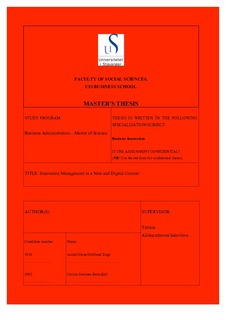| dc.contributor.advisor | Iakovleva, Tatiana Aleksandrovna | |
| dc.contributor.author | Engø, Astrid Olene | |
| dc.contributor.author | Ramsfjell, Cecilie | |
| dc.date.accessioned | 2018-09-19T09:59:00Z | |
| dc.date.available | 2018-09-19T09:59:00Z | |
| dc.date.issued | 2018-06 | |
| dc.identifier.uri | http://hdl.handle.net/11250/2563399 | |
| dc.description | Master's thesis in Business Innovation | nb_NO |
| dc.description.abstract | Students by the University of Stavanger have written this master’s thesis. Our specialization is in Business Administration with Business Innovation as our main field of research.
The need for digital innovations and digital management is increasing and is of a much greater importance today than before. This is because digitalization is becoming a necessity for both firms and their customers in order for firms to continue evolving and to stay competitive. Digitalization also brings new tasks. There are more and more reporting requirements and control measures that may be at the expense of the company’s core function. Actions that were initially meant as time saving are now starting to become time consuming. The abrupt focus on digitalization is becoming increasingly interesting for researchers, but there is however gaps in theory and limited knowledge relevant to this topic. In this thesis we will therefore try to illustrate how existing knowledge and theories of innovation management must adapt to the high demand of digitalization, and what factors that are important for managing digital innovations.
The research question is studied based on the example of three Norwegian firms: Company X is a local business in Rogaland within the banking industry. Company Y is also a local industrial group within sectors such as energy, infrastructure and telecommunications. Company Z is a nationwide organization within house building development, management and digital services.
Findings of this research question uncovers that theories conducted from knowledge on how to manage innovation processes are suitable to further use with the implementation of digitalization in firms. Additionally, the effects of digitalization on the theories are generally positive. It is however crucial for firms to adapt to the changes, and that technological knowledge, skills, and training of employees in new systems are not omitted. This further indicates that following factors are vital to successfully manage digital innovation: skills, knowledge of digital tools, involvement of both employees and customers, the exploration of new digital components, and improvisation. | nb_NO |
| dc.language.iso | eng | nb_NO |
| dc.publisher | University of Stavanger, Norway | nb_NO |
| dc.relation.ispartofseries | Masteroppgave/UIS-HH/2018; | |
| dc.subject | økonomi | nb_NO |
| dc.subject | administrasjon | nb_NO |
| dc.subject | innovasjon | nb_NO |
| dc.subject | digitalisering | nb_NO |
| dc.title | Innovation Management in a New and Digital Context | nb_NO |
| dc.type | Master thesis | nb_NO |
| dc.subject.nsi | VDP::Social science: 200::Economics: 210::Business: 213 | nb_NO |
